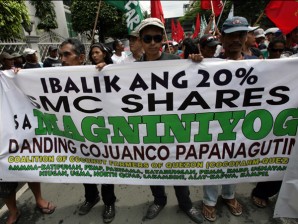Farmers assail ‘coco levy fund mafia’, clash with cops

INQUIRER FILE PHOTO
MANILA, Philippines—Hundreds of protesting farmers stormed the offices of the National Anti-Poverty Commission in Quezon City on Thursday, clashing with riot policemen who tried to stop them with fire extinguishers.
Led by the leftist Kilusang Magbubukid ng Pilipinas (KMP), the farmers from Bicol, Quezon, Aurora and Cagayan provinces forced their way into the NAPC headquarters to air their demand that the agency be stopped from touching the controversial “coco levy” funds for its poverty alleviation projects.
At least one police officer, identified as Colonel Pedro Sanchez, was hurt during the clash. But KMP campaign officer Jim Fernando said the farmers simply retaliated when the policeman acted violently.
“The farmers were only defending themselves. He was too aggressive with his truncheon,” Fernando said.
KMP leaders said Quezon City policemen sprayed them with fire extinguishers to stop them from entering the compound, carrying placards and streamers. But they were able to force their way in and occupied the lobby, where they voiced their grievances.
Article continues after this advertisementIn a statement, KMP said the farmers were demanding the dismantling of what they described as the “coco levy fund mafia,” referring to the Malacañang-created Presidential Task Force on the Coco Levy Funds.
Article continues after this advertisementThe task force, according to the KMP, was pushing for the five-year “Poverty Reduction Roadmap of the Coconut Industry,” a program that would cost the government some P11.17 billion, most of it to be taken from the coco levy funds.
The road map is to be implemented by various agencies, including the NAPC, the Department of Social Welfare and Development, and the Department of Agrarian Reform, and will encompass related projects, such as the “conditional cash transfer (CCT) program,” the “Pantawid Pamilyang Pilipino Program,” and the Comprehensive Agrarian Reform Program Extension with Reforms.
“The Palace-created coco levy fund ‘mafia’ is hell-bent in scheming to once again plunder small coconut farmers’ money,” said KMP deputy secretary general Willy Marbella.
Marbella said “concerned government officials brought to our attention that Rocamora is advancing P1.6 billion from the coco levy funds for his anti-peasant poverty reduction roadmap of the coconut industry.”
The group also suggested that the NAPC, headed by Joel Rocamora, a former president of the Akbayan party-list group, might use P1.6 billion taken from the nearly P70 billion coco levy fund for political purposes, particularly the senatorial campaign of Akbayan’s former congressional representative Risa Hontiveros-Baraquel.
“We smell something fishy from Rocamora’s scheme to advance P1.6 billion from the coco levy funds. It seems they are beefing up not only their pockets but their party’s campaign chest,” Marbella said.
Rocamora, however, said the inter-agency task force, of which NAPC was part, did not expect it would be able to use the coco levy funds at least until the end of the year.
“Given how the Supreme Court rules, and given the bureaucracy, the government should count itself lucky if the coco levy funds became available by the end of the year,” he said. He denied that his agency would use the funds for any political purpose.
He said it was true that the NAPC would request money once the coco levy funds become available, as the poverty alleviation programs would be used for the benefit of the poorest coconut farmers.
The Supreme Court recently upheld a court decision to award to the government the 24-percent chunk of SMC shares, which was part of the 51 percent block of SMC shares that the government sequestered in 1986 on suspicion that they were acquired illegally using proceeds of a tax collected for nine years during the Ferdinand Marcos dictatorship.
The ruling stated that the coco levy funds were public funds to be used by government for the benefit of coconut farmers and to develop the coconut industry.
In April 2011, another 20 percent chunk of SMC shares valued at P58 billion was awarded by the Supreme Court to Marcos crony Eduardo “Danding” Cojuangco, President Aquino’s uncle.
Rocamora, however, said the court decision on the 24-percent bloc of shares was not yet considered “executory” as there was no entry of judgment issued on the ruling.
He noted that the Presidential Commission on Good Government, through the Office of the Solicitor General, recently asked the high court to say if its decision applied to another four-percent chunk of SMC shares sequestered by government.
Rocamora said the government could not grant KMP’s demand for immediate cash distribution of the coco levy fund.
“The problem with that proposal is there is no way to identify who are the genuine beneficiaries,” he said. He said the Supreme Court decision also specifically stated that there was to be no distribution of the coco levy funds to private individuals.
Rocamora said cash distribution would be tantamount to a “dole-out,” a criticism that had also been leveled at the government’s conditional cash transfer program.
“What makes more sense is to use the money from the coco levy for projects that will benefit the poorest coconut farmers instead of giving them out to specific individuals,” he said.
The KMP, however, was not convinced.
“The coco levy funds were exacted from our sweat and blood,” Marbella said. “The money should be immediately returned to small coconut farmers and not to failed anti-peasant programs, like the CCT and CARPER,” he said.